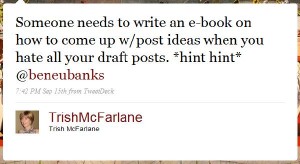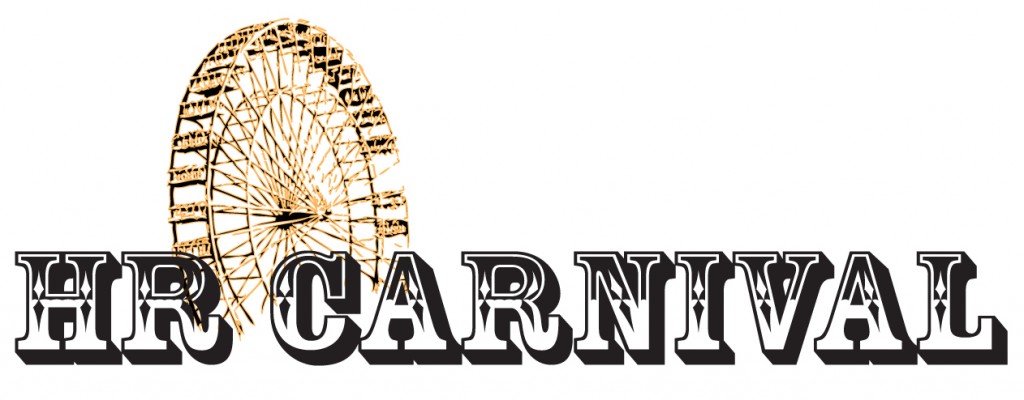This post was written last week, and I have since written about HRevolution (the HR unconference) and announced the new look for the blog. But you still want to see me in action, right? Continue reading
Category Archives: Featured
25 Pieces of HR Awesomeness
I’m thrilled to be hosting my first HR carnival, and that’s for several reasons. First, I get to converse with a few great writers behind the scenes. Second, I get the opportunity to promote those writers all in one place. And third, I get to unveil the new HR Carnival logo, created by the illustrious Allen Robinson (or “LogoMan” according to Eric Winegardner). No longer will carnival hosts have to search for an image to use with their rendition of an HR carnival.
If you haven’t read my last post about how to make the HR carnival really matter , please hop over there and read it before continuing. I promise you’ll get more out if it if you do. Enough about me. Let’s showcase those great writers I was talking about! Continue reading
10 reasons to hire zombies
 It’s October. That means Halloween is just around the corner. And I’ve got a Halloween business strategy that employers will be dying to get their hands on. Okay, I’ll let you in on my secret. Zombies. What if your HR reps could reanimate dead flesh and bring those zombies into the workplace? The potential benefits more than outweigh the occasional brain-eating frenzy. Here are 10 reasons to hire zombies in your workplace…
It’s October. That means Halloween is just around the corner. And I’ve got a Halloween business strategy that employers will be dying to get their hands on. Okay, I’ll let you in on my secret. Zombies. What if your HR reps could reanimate dead flesh and bring those zombies into the workplace? The potential benefits more than outweigh the occasional brain-eating frenzy. Here are 10 reasons to hire zombies in your workplace…
- Use them to cull the bad employees from the herd. That should discourage the ‘ole quit-and-stay mentality.
- While they\’re not great at complex tasks, you can use them as motivators for the people who do those types of work. Bob in accounting wouldn\’t screw up the numbers with a zombie hanging over his shoulder!
- Since they don\’t get diseases or sickness, you won\’t have to waste any more time with FMLA.
- The benefits package would be cheap. They don\’t even need vacation pay!
- Zombies don\’t get tired, and they never waste time on Twitter (although Zombiebook is growing in popularity from what I hear).
- Everyone loves zombies. They\’re so cuddly. There have been dozens of movies dedicated to their antics.
- There is a drastically simplified recruiting/hiring process associated with zombies, and it\’s actually just a single question. Are you a zombie? [grunt] Great! You\’re hired.
- In case #7 worries you, don\’t freak out too much. Zombies aren\’t a protected EEOC class. I checked.
- You can train them to recognize and attack union organizers, IRS agents, or OSHA inspectors.
- With all of the recent employee engagement talk, you really don\’t have to worry. Zombies stay 100% engaged until a shotgun blast pulverizes their skull.
But, as always, I’m not covering something. What are we missing? Is there another great reason to hire zombies that I’m not covering? Drop it in the comments below! And if you enjoyed this list, then you might want to check out the Batman list as well!
Update: I posted a sequel list (more reasons to hire zombies). Check it out!
How to leave your job
 I frequented the multitude of career blogs when I was job hunting, and while I could find dozens of posts on how to get a job, I really didn\’t see anything that helped with how to leave a job. What\’s okay and what\’s not? Is it a problem if I email some people and not others? Should we have a going-away party or celebration? And that\’s just what I can pull from the top of my head. I\’m willing to bet that many of you have experienced the same questions when you want to leave your job and don\’t know the “how†that is involved. Don\’t worry, though, I\’ve found something that is going to help. It’s “The Exit Guide” from Jobacle.
I frequented the multitude of career blogs when I was job hunting, and while I could find dozens of posts on how to get a job, I really didn\’t see anything that helped with how to leave a job. What\’s okay and what\’s not? Is it a problem if I email some people and not others? Should we have a going-away party or celebration? And that\’s just what I can pull from the top of my head. I\’m willing to bet that many of you have experienced the same questions when you want to leave your job and don\’t know the “how†that is involved. Don\’t worry, though, I\’ve found something that is going to help. It’s “The Exit Guide” from Jobacle.
Before I created UpstartHR, I wrote for a career site called Jobacle. I developed a great relationship with Andrew, the owner, and we still chat pretty often. When I found out that he was releasing a guide on how to leave your job, I knew it was something I needed to share.
Jobacle is a blog written by the worker, for the worker, and it\’s just one part of the Jobacle brand. In addition to the 5+ years of articles and posts on the blog, Andrew has also build a library of dozens of career podcasts that are completely free for the taking. In other words, he has proven himself to be a trustworthy source for thousands of job seekers over the years. Now he has developed his first guide, and I couldn\’t be happier for him.
If you\’d like to get your own copy of “The Exit Guide,†just click the link and see for yourself what he has put together to help you with how to leave your job. I think you\’ll be thrilled with the result!
Goodbye, HRCI Recent Graduate Exemption

This test looks interesting
I took the PHR exam this past January. It was a tough experience, but I also enjoyed knowing that it would solidify my grasp of the basic theoretic principles of HR. I didn’t yet have the requisite two years of exempt level HR experience necessary to take the exam, but I was able to take it under the “Recent Graduate” exemption that HRCI provides. From HRCI:
Students and recent graduates enrolled in a bachelor\’s or graduate degree program may take the PHR and GPHR exams at an initial registration rate of US$120. Passing students and recent graduates must pay the balance of the exam fee once they have graduated and documented two years of exempt-level (professional) HR work experience. They have five years from the date of passing the exam to obtain the two years of exempt-level (professional) HR work experience.
Student/recent graduate candidates are not eligible to take the SPHR certification exam. Student/recent graduate candidates must take the exam no earlier than 12 months before their graduation date and no later than 12 months after graduation from a bachelor\’s or graduate degree program.
Recently, I learned that HRCI is going to be dropping the Recent Graduate exemption. In fact, the certification requirements are changing in multiple ways by 2011. I still haven’t made up my mind yet about how I feel on the changes, but here is what HRCI says:
|
PHR Eligibility |
SPHR Eligibility |
GPHR Eligibility |
| • 1 year of demonstrated exempt-level HR experience with a Master\’s degree or higher • 2 years of demonstrated exempt-level HR experience with a Bachelor\’s degree • 4 years of demonstrated exempt-level HR experience with less than a Bachelor\’s degree |
• 4 years of demonstrated exempt-level HR experience with a Master\’s degree or higher • 5 years of demonstrated exempt-level HR experience with a Bachelor\’s degree • 7 years of demonstrated exempt-level HR experience with less than a Bachelor\’s degree |
• 2 years of demonstrated global exempt-level HR experience with a Master\’s degree or higher • 3 years of demonstrated exempt-level HR experience (with 2 of the 3 being global HR experience) with a Bachelor\’s degree • 4 years of demonstrated exempt-level HR experience (with 2 of the 4 being global HR experience) with less than a Bachelor\’s degree |
Pros
There are several reasons for these changes. The biggest one that I can think of is that they want the exams to be more meaningful. If some “upstart” :-) can take the exam after college and pass without any exempt level HR experience, then that doesn’t necessarily mean that they’re as qualified as someone who has years of HR experience before deciding to take the exam. And if I was one of those experienced pros who decided to get certified, it would probably bother me to know that there’s someone in the next booth with none of my experience taking the same certification exam.
Cons
On the flip side, what about that student/recent grad? If they pay the fee, put in the hours of study time, and complete the exam, then why can’t they be rewarded for those efforts? If they choose (as I did) to try to put themselves into a better position in a promotion or hiring situation, why should they be kept from that opportunity?
I’d love to hear your thoughts on the pros and cons of the decision to change the requirements.
Anyway, if you happen to be one of those people with less than two years of experience, then you should seriously consider taking the PHR exam while you still have the opportunity. In fact, if you are in that group and you’d like to shoot me an email, I’ll give you a discount on the Rock the PHR guide to help you get started.
20+ Ideas to Inspire Creativity
 This isn\’t going to appeal to everyone, but I\’m putting it out there just the same. I get questions often from my many blogging friends. They usually center on finding new ideas to write about and keeping the spark of creativity alive. Even though I\’m technically an HR newbie, I pride myself in creativity. I wrote a lot of fiction before I started writing the kind of stuff that I do now, and I\’ve always been able to cobble together a story from a single thought fragment. So here are some ideas for you to inspire your own creativity. If you\’re a blogger, you\’ll be using these ideas for that. If you\’re not, then they might help you with something else. Trying to solve a problem at work? #6 has helped me with that dozens of times. I\’ve also included these as a free PDF for your downloading pleasure! Put it up by your computer and check it when you\’re stuck. 20+ Ideas to Inspire Creativity
This isn\’t going to appeal to everyone, but I\’m putting it out there just the same. I get questions often from my many blogging friends. They usually center on finding new ideas to write about and keeping the spark of creativity alive. Even though I\’m technically an HR newbie, I pride myself in creativity. I wrote a lot of fiction before I started writing the kind of stuff that I do now, and I\’ve always been able to cobble together a story from a single thought fragment. So here are some ideas for you to inspire your own creativity. If you\’re a blogger, you\’ll be using these ideas for that. If you\’re not, then they might help you with something else. Trying to solve a problem at work? #6 has helped me with that dozens of times. I\’ve also included these as a free PDF for your downloading pleasure! Put it up by your computer and check it when you\’re stuck. 20+ Ideas to Inspire Creativity
1. Take an old post and explore it from a different angle.
2. What do you read? Watch? Listen to? Enjoy? Each is a source of inspiration!
3. Open your RSS reader. Find a post you starred/enjoyed. Write a corollary or a counterpoint.
4. Use Google Alerts to show you news on a given topic.
5. Use Google Trends to find something “hot” to write about.
6. Turn off the radio in the car. You’d be surprised what happens when you don’t have music drowning out your “voice.”
7. Make a funny top 10 list.
8. Find a calendar of holidays and pick one to write about.
9. Find a quote that hits you a particular way and expand it into a paragraph or two.
10. Take a well-known phrase and apply it to your blog’s focus to develop a topic.
11. Review an item that you’ve used recently (book, movie, service, etc.)
12. Take two or more blog posts from other bloggers and tie them together with some of your own thoughts.
13. Predict something. It can be funny or serious, but it should stimulate readers.
14. Take an opposing stance to your normal ideas and try to make it convincing.
15. Force yourself to come up with 25 ideas for something. Anything. Twenty four of them might be horrible, but one could be a gem! 50 is better.
16. Write from a different point of view. Maybe try to demonstrate the POV from the VP level, manager level, and entry level.
17. Find someone to talk with about your blog. It can give you ideas, get you motivated, and help you propel yourself to a new level.
18. Find a new place to write. Even if that means lying in the closet floor with a laptop (Hey, whatever works!).
19. Comment on other blogs and use that as the basis for a new post. Similar to #3, but you give the other blogger a little comment love as well.
20. Go back and pick one of your first dozen posts to update.
21. Save your drafts. Even if it’s not looking like a good post, you never know when inspiration will strike and help you turn that puppy around.
22. Have a conversation in person with someone. Let that stimulate your brain. Quote the person in the post (people love that!).
23. Revisit your blog’s purpose and what you want to accomplish. Just refreshing yourself on that should give you some ideas, especially if you can think back to why you started it in the first place.
Turning Employees into Brand Champions
From VentureRepublic:
Brand champions are internal and external story tellers who spread the brand vision, brand values and cultivate the brand in an organisation. Every organisation needs committed and passionate brand champions. The more employees the organisation can turn into brand champions, the better will it be equipped to build and maintain strong brand equity. Singapore Airlines, L’Oreal, Harley Davidson, Nike, Google and LEGO are well-known examples of companies which benefit tremendously from their employees being strong and dedicated brand champions.
My company has more employees than it has customers. These employees leave work every day and have conversations and interactions with complete strangers in homes, bars, stores, restaurants, etc. Some of those people know our company exists, and some are getting their first glimpse of us.
 Are they saying good things? Are they telling the world how amazing it is to work for this company? Are they enhancing our reputation?
Are they saying good things? Are they telling the world how amazing it is to work for this company? Are they enhancing our reputation?
I hope so.
Some people recommend hiring great people and inspiring them to do amazing things. Sounds like a plan to me. Find a way to make brand champions out of your employees. You won\’t regret it.
Photo by pinksherbet
